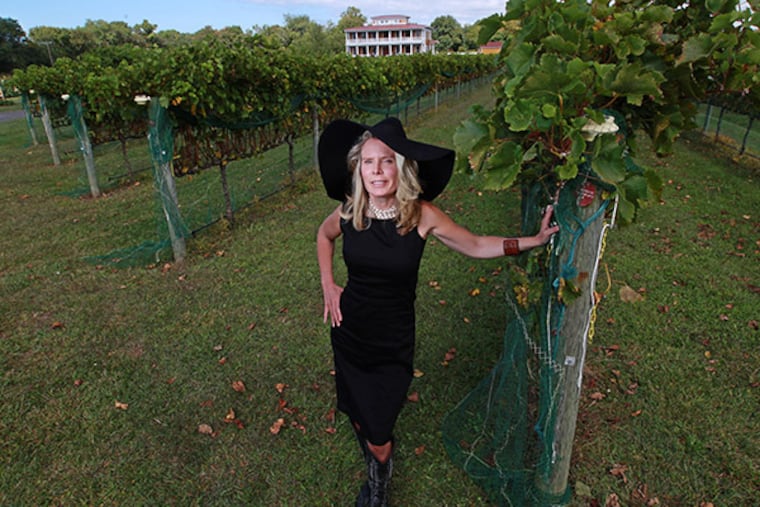Winery's relationship with West Cape May has soured
WEST CAPE MAY - On a bucolic 50 acres at Willow Creek Winery, where the cross breezes of the bay and the ocean mingle, over a vineyard of soil of salt and sand, an enviable microclimate and a unique terroir has been created.

WEST CAPE MAY - On a bucolic 50 acres at Willow Creek Winery, where the cross breezes of the bay and the ocean mingle, over a vineyard of soil of salt and sand, an enviable microclimate and a unique terroir has been created.
And with a visually stunning villa and a nearby 7,800-square-foot post-and-beam "tasting room," the site more resembles a vineyard on the hillside in Bordeaux or California wine country than a winery on the southernmost peninsula of New Jersey.
"This place has meaningful roots in the community, with a focus on sustainable agriculture," said Kevin Celli, Willow Creek's winemaker.
But while bunches of deep purple varietals hang heavy on the vines, ready for this year's harvest, a long-standing dispute between the winery's owner, Barbara Wilde, and the Borough of West Cape May continues to ferment.
Is Willow Creek a farm that hosts events? Or is it a catering business that holds weddings, birthday parties, and other celebratory receptions?
A Superior Court judge last week dismissed a lawsuit the borough filed against Wilde. It alleged that she illegally hosted weddings and other events outside the conditions outlined in an expanded state Right to Farm law enacted in July. The law allows New Jersey's vineyards to expand their business operations while remaining largely agricultural enterprises.
"It would be a jewel in the crown of West Cape May if the winery was being operated the way it should be," contends the borough's solicitor, Frank Corrado.
"We feel she is running a commercial event venue disguised as a winery," Corrado said. "We just want her to comply with the requirements that any other business would have to comply with."
Judge Allen Littlefield ruled that the borough does not govern that law, a guideline of 11 requirements enforceable only by the State Agricultural Development Committee (SADC). The judge said the town would have to take up its fight with the committee rather than trying to hash it out in court.
Corrado said Monday that local officials had not yet decided whether the borough would appeal the ruling, file a complaint against Wilde with the SADC, or do both.
In 2009, as part of a farmland preservation program, Cape May County paid Wilde $890,000 to deed-restrict 36 acres of the property, indicating that the land would forever remain agricultural. The borough contends that includes acreage where the tasting room is located.
While local officials have maintained that the property should be restricted from hosting catered events because of the deed provisions, county officials have said Willow Creek obtained "annexed certification" and never sold its right to hold "celebratory events" in the preservation process, according to Freeholder Director Gerald Thornton.
Willow Creek is sandwiched between two farms - which Wilde's attorney, Colin G. Bell, contends hold events similar to those held at Willow Creek.
Borough officials say those properties host festivals and other events that are more in keeping with an agricultural theme rather than a "commercial catering enterprise," Corrado said.
But the state Department of Environmental Protection said Wilde has appeared to comply with all the state's land preservation regulations, and awarded the winery a citation this year for outstanding stewardship of the land.
Wilde is suing the borough and filed a complaint against Mayor Pam Kaithern with the New Jersey State Ethics Commission, noting that Kaithern lives within 200 feet of the winery and saying she should have recused herself from any proceeding or actions against Willow Creek.
The lawsuit also alleges that Kaithern routinely performs wedding ceremonies throughout West Cape May and Cape May on properties owned by the winery's competitor, and attempted to thwart Wilde's efforts to open the business by insisting on an inordinate number of inspections prior to opening.
Kaithern did not return calls for comment.
Wilde contends that officials in the town have perpetuated a "culture of hatred" against the winery by spreading false rumors about its operation. Wilde said she has been hosting events at Willow Creek since 2013.
"Instead of embracing a business enterprise that is an asset to this area and provides 26 jobs, and is part of what is quickly becoming one the biggest tourism draws in the area, they've chosen to discriminate against us," Wilde said. "I feel like they would like to bankrupt me and shut me down and put 26 people out of a job."